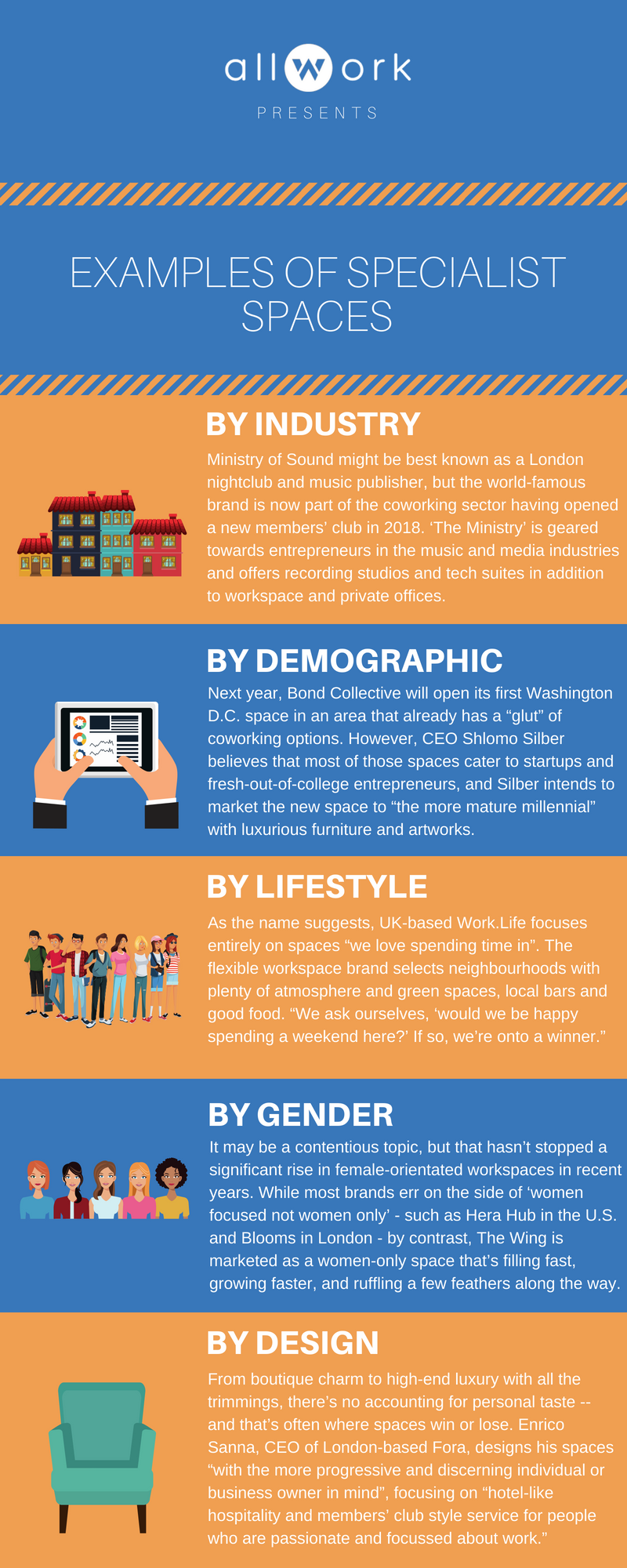- While there is always a place for ‘general’ workspaces, operators can compete with larger spaces by specialising their offering
- With hundreds of new spaces opening every month, independent operators are urged to “focus on a particular customer segment”
- From industry sectors and lifestyle choices to specialist design, there are many ways operators can differentiate their spaces
Across the world, 8 new coworking spaces open every single day.
That’s the estimate from Emergent Research and GCUC, which published its report in December 2017 forecasting that the number of global coworking spaces will grow from 14,411 to just over 30,000 by 2022.
With more than 3,100 new spaces expected to open annually within the next five years, not to mention expansion of existing locations, how do independent operators remain competitive? What’s to stop members trying out the new space down the road, or succumbing to attractive cut-price discounts by larger players?
The answer, according to some industry experts, is specialisation.
While large coworking spaces — and especially WeWork — get most of the attention, “the number of smaller niche-oriented spaces continues to grow rapidly” according to GCUC and Emergent Research’s report.
These spaces are designed for members with specific needs based around their industry, their work, and even their gender, ranging from shared ‘maker spaces’ and labs to industry-specific and women-focused spaces.

Standing Out in a Crowded Market
“Generalisation will get you in trouble,” says Fora’s Enrico Sanna, who presented at the eOffice Conference in London in June 2018. He warns against “getting stuck in the middle” and instead encourages independent operators to “focus on a particular customer segment”.
He said that around 50% of their business comes from people who are moving away from traditional offices and choosing Fora’s “pro-working” approach. They aim to support their members’ needs by acquiring the entire building and thereby controlling the complete end-to-end workplace experience.
For Fora, a hotel-style guest experience is paramount. “My front of house is my brand,” Sanna noted. “Because of that, we invest in our staff. We even carry out a psychoanalysis of every member of staff to find out if they really are focused on service and hospitality.”
To compete with larger players and to differentiate, Sanna emphasises that brand is fundamental. “Pick what you want to be, build it, invest in your brand, and deliver on your promise. Stick to your values — you have to be authentic.”
Specialist Spaces are the Future
While there is always a place for ‘general’ workspaces, rising competition and market saturation means operators in certain geographical areas have a unique opportunity to compete with larger spaces by specialising their offering.
For Natasha Guerra, CEO of Runway East in London, their target is high-growth startups. In Shoreditch and Moorgate, competition for this sector is fierce — but Guerra started at the right time.
Runway East started as a temporary popup in 2014 “when there was a clear gap in the market,” and she immediately identified the needs of local startups by offering a support network to solve shared problems.
“We know that in startups, one person is often in charge of lots of different departments,” she said, speaking during the eOffice Conference. “We run events that bring together those people in similar roles from multiple firms to help thrash out and solve shared problems.”
For Guerra, specialised spaces are “the future” of the coworking and flexible workspace industry — and she’s certainly not alone in her thinking.
Earlier this year, Steve King from Emergent Research discussed the rise of niche coworking spaces, noting that just like hotel choices, many people have a specific type or style of environment in mind when choosing a workplace.
“A lot of people don’t want to stay at Marriotts, they want to stay at a boutique hotel; they don’t want to eat at Morton’s, they want to eat at the local restaurant. We’ve already seen that with niche spaces of all kinds popping up, whether for architects or lawyers or musicians or women… Those spaces will continue to thrive if they’re well-run.”
Of course, the world’s coworking and flexible workspace portfolio will always have its fair (and possibly dominant) share of vanilla environments. But in an industry that celebrates individuality — through design, style, and communities — the industry has an exciting future peppered with multiple flavours and experiences.
















